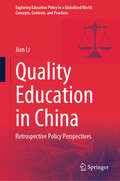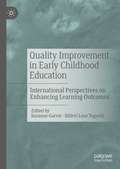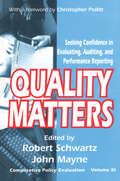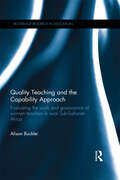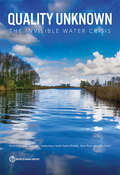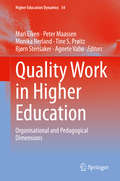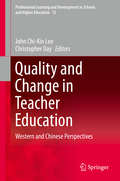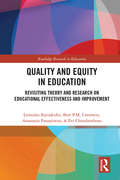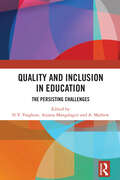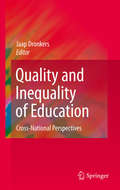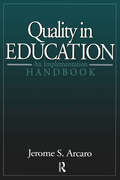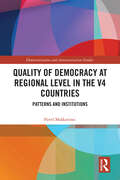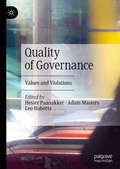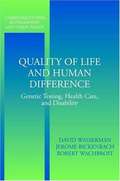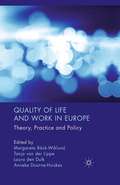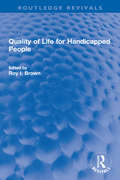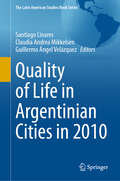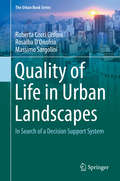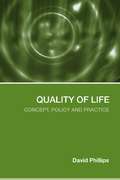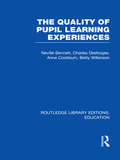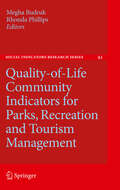- Table View
- List View
Quality Education in China: Retrospective Policy Perspectives (Exploring Education Policy in a Globalized World: Concepts, Contexts, and Practices)
by Jian LiThis book explores quality education in China from a retrospective policy perspective. It approaches the topic of quality education from multiple dimensions, such as the historical development of quality education policy, the quality education policy model, the assessment of quality education policy, the resource allocation of quality education policy, and quality education and personnel cultivation in China. This book highlights that the all-round implementation of quality education allows basic education to return to its original nature, and advocates transferring basic education from 'exam-oriented education' to 'quality education' in China.
Quality Improvement in Early Childhood Education: International Perspectives on Enhancing Learning Outcomes
by Susanne Garvis Hillevi Lenz TaguchiThis book explores international perspectives on quality improvement within the field of early childhood education and care. Many countries and governments are focusing on preschool quality as a way to improve entrenched inequalities and reduce social disadvantage and segregation: this book draws together various global case studies to showcase how different countries tackle aspects of quality improvement. The concept of quality is understood in different ways both culturally and contextually, and the implementation of measures to improve quality will differ from country to country. The book draws together case studies from numerous contexts to showcase various ways of working with aspects of quality improvement. Sharing important insights into policy and practice, this book guides a shared understanding of the complex nature of quality improvement within early childhood education and care.
Quality Matters: Seeking Confidence in Evaluating, Auditing, and Performance Reporting (Comparative Policy Evaluation Ser. #Vol. 11)
by John Winston MayneInformation--regular, systematic, reliable--is the life-blood of democracy and the fuel of effective management. Surely today there is no problem with information, for this is the age of information overload. It pours onto our computer screens and out of our printers. Indeed, many governments claim, often with some justification, to be more open and transparent than ever before. But what if the life-blood is contaminated, or the fuel polluted? Then the body politic sickens and the engine of public management runs rough. It is the vital issue of the quality of the information we receive that this book addresses. Quality Matters compares approaches across different jurisdictional settings and across three different types of information evaluation. The chapters describe and analyze quality assurance in a number of countries and within a variety of international organizations. These have been selected either because they are widely considered to be leaders in evaluating information or because they have experience with assuring quality information that can instruct others. Contributors are from Australia, Canada, the European Union, France, the Netherlands, New Zealand, Sweden, Switzerland, United Kingdom, United States, and the World Bank. This pioneering study analyzes practices for assuring the quality of evaluation, performance auditing, and reporting in the face of political, organizational, and technical obstacles. A final chapter addresses the extent to which quality assurance systems become bothersome rituals or remain meaningful mechanisms to ensure quality control. This well-structured volume will be of particular interest to policymakers and adds much to the literature on program evaluation and performance auditing.
Quality Standards, Value Chains, and International Development
by Johan SwinnenOver the past decades, the world has witnessed an unprecedented growth in global value chains, propelled by increasingly demanding quality standards. These trends lead to concerns about the impact of value chains on development and poverty and about the possible protectionist nature of quality standards in rich countries. This book offers the first integrated theoretical analysis of the economic and political factors which determine the level of quality standards, as well as their economic effects along the value chain. Using realistic assumptions motivated by empirical research, the theoretical framework in this book makes it possible to study the efficiency effects as well as the distributional consequences of one of the most striking evolutions affecting global trade and development today.
Quality Teaching and the Capability Approach: Evaluating the work and governance of women teachers in rural Sub-Saharan Africa (Routledge Research in Education)
by Alison BucklerThis book provides an analytical exploration of the condition of teachers working in expanding school systems across the world, with a particular focus on the lives of women teachers in rural Sub-Saharan Africa. Drawing from award-winning research, it looks beyond the official portrayals of teachers’ lives in order to better understand the reality of the contexts in which teachers live and work. Positioning Amartya Sen’s capability approach at the heart of the study, each chapter considers documentary evidence alongside ethnographic research from rural, remote and under-resourced schools in Ghana, Nigeria, Kenya, South Africa and Sudan. Interweaving rich narratives from teachers in a variety of contexts, the book proposes a concept of professional capability and examines female teachers’ agency to pursue and achieve this in their classrooms. This key examination challenges existing notions of ‘quality education’ and reveals insights into the broader purpose of schooling for rural communities. Quality Teaching and the Capability Approach will be of value to researchers, academics and postgraduate students in education, particularly those concerned with gender, development and teaching, as well as educationalists and policy makers concerned with education and development.
Quality Unknown: The Invisible Water Crisis
by Richard Damania Sébastien Desbureaux Aude-Sophie Rodella RussWater quantity—too much in the case of floods, or too little in the case of droughts—grabs public attention and the media spotlight. Water quality—being predominantly invisible and hard to detect—goes largely unnoticed. Quality Unknown: The Invisible Water Crisis presents new evidence and new data that call urgent attention to the hidden dangers lying beneath water’s surface. It shows how poor water quality stalls economic progress, stymies human potential, and reduces food production. Quality Unknown examines the effects of water quality on economic growth and finds upstream pollution lowers growth in downstream regions. It reveals that some of the most ubiquitous contaminants in water, such as nitrates and salt, have impacts that are larger, deeper, and wider than has been acknowledged. And it traces the damage to crop yields and the stark implications for food security in affected regions. An important step toward tackling the world’s water quality challenge is recognizing its scale. The world needs reliable, accurate, and comprehensive information so that policy makers can have new insights, decision making can be evidence based, and citizens can call for action. The report calls for a paradigm shift that emphasizes safer, and often more cost-effective remedies that prevent pollution by combining smarter policies with newer technologies. A key message of Quality Unknown is that such solutions exist and change is possible.
Quality Work in Higher Education: Organisational and Pedagogical Dimensions (Higher Education Dynamics #54)
by Peter Maassen Bjørn Stensaker Monika Nerland Mari Elken Tine S. Prøitz Agnete VabøThis book focuses on quality work in higher education, and examines the relationship between the organizational and pedagogical dimensions of quality work in higher education. Bringing together different disciplinary traditions, including educational science, sociology, and organisational studies, it addresses the following principal research question: How is quality work carried out in higher education?The book addresses a wide variety of academic, administrative and leadership practices that are involved in quality work in higher education institutions. The chapters in this book examine core issues crucial in the design and content of study programs, such as modes of teaching, learning and curricula design, as well as institutional practices regarding assessment and quality enhancement. The introductory and concluding chapter present an overarching focus on quality work as a lens to analyse intentional activities within higher education institutions directed at how study programmes and courses are designed, governed, and operated.
Quality and Change in Teacher Education
by John Chi-Kin Lee Christopher DayHow teachers may be better educated for a changing global world is a challenge that faces many systems of education worldwide. This book addresses key issues of quality and change in teacher education in the context of the new public management achievement agendas which are permeating teacher education structures, cultures and programmes and the work of teacher educators internationally. Graduate schools of education in the United States and the UK, for example, are making fundamental changes in the structures, courses, programs and faculties that prepare beginning teachers each year. Drawing upon examples from the United States, United Kingdom, China, Hong Kong, Australia and elsewhere, its authors provide a unique critical overview of emerging themes and challenges of raising the quality of teaching and the quality of student learning outcomes. They suggest possible ways forward for teachers, teacher educators, researchers and policy-makers as they seek to raise the quality of teaching and student outcomes whilst sustaining their moral purposes and values of equity, inclusion and social justice. Taken together, the chapters contain informed, critical discussions of "normal education" and "teacher education" of "professional standards", "4+2/+1" post-degree training, "PGDE versus BEd", integration of subject specializations and professional education. Each one provides new visions of the teacher as a professional and to cultivate high quality teachers in the West and the Greater China region. For all those interested in issues of quality, change and forward movement in teacher education in contexts of policy led reform, this is a must read.
Quality and Equity in Education: Revisiting Theory and Research on Educational Effectiveness and Improvement (Routledge Research in Education)
by Leonidas Kyriakides Evi Charalambous Bert P.M. Creemers Anastasia PanayiotouQuality and Equity in Education draws attention to the importance of developing and testing theories of educational effectiveness and using these theories for improvement purposes. It makes a major contribution to knowledge and theory building in research on promoting quality and equity in education. The book presents an improved version of the dynamic model of educational effectiveness based on the empirical data emerged from studies testing its validity, claiming that the proposed theory can be used for establishing links between educational effectiveness research and school improvement. Towards that end, the book presents the Dynamic Approach to teacher and school improvement, demonstrating its impact on quality and equity in education. The book not only proposes an agenda for further research on developing and testing the dynamic theory of educational effectiveness but also refers to research methods that can be used to test the assumptions of this theory and search for relevant cause and effect relations. The agenda also refers to the need of identifying the conditions under which the dynamic approach to teacher and school improvement can have an effect on student learning outcomes. This book will be of great interest for academics, researchers and postgraduate students working in education research and the area of quality and equity in education. It will also be of interest to policymakers, school advisors and other stakeholders in education.
Quality and Inclusion in Education: The Persisting Challenges
by N. V. Varghese Anjana Mangalagiri A. MathewThis book calls for an equitable and qualitative access to education for all. It proposes paradigms of educational governance that are based on coalition building between key stakeholders, are grounded in local and cultural contexts, sensitive to the language needs of communities. It underlines the significance of gender sensitive and inclusive approaches that ensure equity for marginalized children and minorities. Based on research-based studies, the volume focuses on equity, quality, and learning — covering a broad spectrum, from school to higher, to adult education. It discusses the multiple learner deprivations amongst the marginalized communities and the severe impact of events such as pandemics that exacerbate learner inequities and the recent developments in India under the National Education Policy 2020. It also presents research-based country experiences in the Asian (India, Bangladesh, China) and African (Ghana, South Africa) contexts, showing how external influences on the changing priorities in policy perspectives cut across developing countries. Compiled in honour of Professor R. Govinda, this volume of insightful articles will be of interest to students and researchers of educational policy and studies, sociology of education, equity and human rights. It will also be useful for decision makers and think tanks.
Quality and Inequality of Education
by Jaap DronkersThis cogent analysis of data on education and society from a variety of sources sets out to provide answers to scientific and policy questions on the quality of education and the way it relates to various forms of inequality in modern societies, particularly in Europe. The authors examine not only the well known cross-national PISA datasets, but also the European Social Survey and TIMSS, going further than many researchers by folding into their analyses economic, legal and historical factors. Most research up to now using the PISA data is restricted to educational research. Interesting as that educational question is, the chapters here use the PISA, and other data, to explore more profoundly the relationship between education and the various forms of inequality in European and other modern societies. The work comes from two different perspectives: one that looks at how the different characteristics of societies, their economies, and their educational systems influence the average educational achievements of specific groups of pupils, such as immigrants, in those societies; and a second, which explores how, and in what degree, the characteristics of schools, educational systems and labour-markets either hardens or softens differences in the educational outcomes of various groups of pupils. With a special feature of the book being its emphasis on comparing Asian and European countries, and with the content free of the political constraints that can often attend studies of these datasets, this book will be an vital resource for educationalists and policy-makers alike.
Quality in Early Childhood Education and Care through Leadership and Organizational Learning: Organizational and Professional Development (International Perspectives on Early Childhood Education and Development #41)
by Charlotte Ringsmose Line Skov HansenThis book provides insights in to how high quality learning environments in Early Childhood Education and Care (ECEC) develop, and how competent systems can support this. It builds on the knowledge that quality early environments shape the wellbeing and development of the child, and explores how communities of professional practice that support quality development are built. Acknowledging that the conditions for providing high quality pedagogical work depend not only on the individual teacher, but also on collaboration and organizational and professional development. The book draws on a range of theoretical frameworks and research that underline competent systems rather than individualized learning as a path to improve workforce quality and professionalization in the field of ECEC.
Quality in Education: An Implementation Handbook
by Jerry ArcaroAlthough hundreds of school improvement programs have been launched in the United States over the past quarter century, very few of them have been successful. The author of Quality in Education: An Implementation Handbook, an experienced quality expert who specializes in education, believes that many of these programs could have succeeded had their developers understood and applied the theories and methods of Total Quality Management (TQM). This book explains how to avoid the pitfalls that doomed previous efforts to failure, and apply TQM to build a strong foundation for success.Beginning with the basic concepts and tools, this book is your complete guide as you embark on your quality journey. The handbook explains the importance of making a commitment to change and establishing a shared vision of quality, and discusses tools and techniques for overcoming resistance and developing a quality culture. The book covers new methods you can use to manage change, and includes exercises to help you apply the ideas in your organization. Examples from successful schools demonstrate how Total Quality Management can be applied to every area of education, from classroom management to building maintenance.Quality in Education: An Implementation Handbook teaches you how to make fundamental changes to the way people in your district or school view education and themselves as educators. Using the principles and methods in this book ,you can realize the tremendous benefits of quality - continuous improvement in every educational process.
Quality of Democracy at Regional Level in the V4 Countries: Patterns and Institutions (Democratization and Autocratization Studies)
by Pavel MaškarinecThis book systematically examines regional-level qualities of democracy – representation, participation, and competition – in four countries of Central and Eastern Europe between 1994 and 2022, from the establishment of regional self-government to the present day.Focusing on their common EU accession as representing a critical juncture in their processes of consolidation and/or destabilization of liberal democratic patterns of government on both national and subnational levels, the book applies a conceptual framework on the quality of subnational democracy. It provides a clear methodological approach to observing quality and the variability in quality of democracy across various regions and its transformation through long-term comparisons. As such, the book contributes to understanding some of the processes of more than 30 years of Central and Eastern European regional politics, offering conceptual clarifications applicable to research conducted in other contexts.This book is of key interest to scholars and students of democracy, electoral politics, Central and East European politics, local politics, representation, and more broadly, comparative politics.
Quality of Governance: Values and Violations
by Leo Huberts Hester Paanakker Adam Masters"Quality of governance: Values and violations arrives at a time when governance faces new and often dire challenges and as traditional democratic values strain against the rise of authoritarian forms of populism and anti-government sentiment. This comprehensive volume considers these challenges from a variety of angles- transparency, bureaucratic pathologies, public values, sector relations- but at the same time manages a higher degree of integration than one usually finds in most edited volumes. The individual selections focus on topics of widespread interest but with new theories, analytical frameworks and insights. This book should be read by anyone interested the values bases of governance and in exploring good ideas about how to improve policy and management. The book serves a professional academic audience but could also prove quite useful as a text or supplementary book for graduate and undergraduate courses in public affairs."Barry Bozeman, Regents' Professor, Arizona State University, School of Public Affairs, USA. "Public governance matters. It touches almost every aspect of our lives, from the most mundane to the most important, the most commonplace to the most intimate. This book critically examines some of thorniest values and issues for governance in the 21st century -- democracy, legitimacy, accountability, transparency, integrity, professionalism, and more -- all of which are of crucial importance for practice and research on the quality of governance."Tina Nabatchi, Syracuse University, USA, Co-Chair of the Study Group ‘Quality of Governance’ of the International Institute of Administrative Sciences."This volume provides an up-to-date overview of key themes and theories about the quality of governance. Many of the field's most thoughtful scholars have contributed chapters on both the positive and problematic dimensions of good governance, providing fascinating insights in this important topic. Therefore, this book is a must read for all scholars, students, and practitioners interested in improving the quality of governance in their countries and institutions."Zeger van der Wal, National University of Singapore and Leiden University The Netherlands.This volume unravels the meaning of public values for the quality of governance, for good and bad governance, and examines their significance in governance practices. It addresses public values in context, in different countries, policy sectors and levels of governance. In a series of in-depth studies, a critical eye is cast over eight central values: democratic legitimacy, accountability, transparency, integrity, lawfulness, effectiveness (in terms of service quality), professionalism and craftsmanship, and robustness. How does for instance integrity or lawfulness contribute to the accomplishment and preservation of quality, and what happens if we fail to address it adequately? This unique exercise yields important lessons on the differences in normative interpretation and application of often abstract values in the demanding administrative settings of today. Practitioners, scholars and students of public administration, public management and political science will find the volume a vital resource for theory and practice.
Quality of Life and Human Difference: Genetic Testing, Health Care, and Disability
by Jerome Bickenbach David Wasserman Robert WachbroitThis study brings together two important literatures one volume. One concerns the role of quality assessments in social policy, especially health policy. The second concerns ethical and social issues raised by prenatal testing for disability. Hitherto, these two literatures have had little contact with each other: few scholars have written about both, or have compared the two domains in a systematic way, while people with disabilities and disability scholars are underrepresented in recent discussion on health policy and quality of assessment. This book turns the perspectives of disability scholars on issues that have largely been the province of health methodology, policy and philosophy, while angling philosophical policy analysis on problems that have largely been the province of disability scholarship. This volume will be sought after by bioethicists, philosophers, and specialists in disability studies and healthcare economics.
Quality of Life and Well-Being for Residents in Long-Term Care Communities: Perspectives on Policies and Practices (Human Well-Being Research and Policy Making)
by Kevin E. Hansen Jennifer L. Johs-ArtisensiThis book explores key factors long-term care recipients have identified as impacting their quality of life and offers programmatic and policy recommendations to enhance well-being within long-term care communities. Leadership and staff who work in nursing homes and other residential care communities serve as gatekeepers to resident well-being, often without recognizing how residents’ quality of life is impacted by their decision-making. This book takes a life domain approach to build on research-based studies that document key drivers of care recipients’ quality of life, including relationships, autonomy and respect, activities and meals, environment, and care. Using a framework that enhances understanding of resident quality of life, it outlines practical, programmatic, and policy suggestions for long-term care stakeholders, such as administrators, managers, front-line staff, family members, and policy-makers, whose directives and actions impact the lived experience of long-term care residents. As such, this book serves as a roadmap for leaders and managers of long-term care communities, along with policymakers who regulate health and human services, to best structure care environments to maximize quality of life and well-being for long-term care recipients.
Quality of Life and Work in Europe: Theory, Practice and Policy
by Tanja van der Lippe Laura Den Dulk M. Bäck-Wiklund T. Van Lippe L. Den Dulk A. Doorne-HuiskesIntense globalization, rapidly changing workplaces and family patterns have renewed the international interest in quality of life. This book examines different institutional arrangements, work-place conditions and gendered work and care that affect the conditions for achieving quality of work and life in European countries.
Quality of Life for Handicapped People (Routledge Revivals)
by Roy I. BrownFirst published in 1988, Quality of Life for Handicapped People examines developments and innovations in research and practice concerning the quality of life for those with disabilities. The book centres on the topic of rehabilitation education, with a particular focus on issues relating to quality of life, including what is meant by ‘quality of life’ and the measures and systems required to assess the variables involved. It highlights the significance of rehabilitation education in underlining the key issue of how individuals feel about themselves and how they perceive the services available to them for the purpose of rehabilitation. It considers the importance of environment and the improvement of environment in increasing quality of life, and examines a range of vocational and social programmes from a variety of perspectives. Quality of Life for Handicapped People will be of use to those with an interest in the history and development of rehabilitation education.
Quality of Life in Argentinian Cities in 2010 (The Latin American Studies Book Series)
by Claudia Andrea Mikkelsen Santiago Linares Guillermo Ángel VelázquezThis book introduces a quality of life index that compares the intra-urban particularities of 23 cities in the Argentine Republic. Integrating demographic size, functional specialization, and regional location, the chapters employ a standard set of variables to assess socioeconomic and environmental inequality and wellbeing. A result of collaboration between 33 contributors from institutions around the country, the book provides a rich assessment of the mechanisms and processes by which the residential areas of Argentinian cities form, change, develop, and decline. Consistent measures of education, health, housing, and environmental wellbeing allow for deep examinations of each area and meaningful comparisons between them. The book also explores patterns that recur in multiple cases. Redevelopment and renewal processes in central and old areas of cities can lead to the creation or reenergization of modern, high-density neighborhoods that, benefitting from new construction and integrated commercial and service areas, exhibit high quality of life indices. Urban expansion stands out as a process that often results in or reinforces socio-spatial segregation: New, exclusive, low-density residential neighborhoods with single-family homes and green areas tend to have a high level of quality of life, thanks to good education, health services, housing, and natural amenities. In contrast, low-income neighborhoods with precarious housing, limited access to health and education services, and unfavorable environments exhibit lower quality of life measures. Increasingly common gated communities—with private security, exclusive services, and (internally) shared recreational spaces—reinforce this pattern of segregation. Analyzing the quality of life in different Argentinian cities is important to understanding the living conditions of the inhabitants, identifying areas for improvement, and supporting the development of inclusive and sustainable policies. These measurements can facilitate more just and prosperous environments for all citizens.
Quality of Life in Urban Landscapes: In Search Of A Decision Support System (The Urban Book Series)
by Roberta Cocci Grifoni Rosalba D'Onofrio Massimo SargoliniThis volume introduces an innovative tool for the development of sustainable cities and the promotion of the quality of life of city inhabitants. It presents a decision-support system to orient public administrations in identifying development scenarios for sustainable urban and territorial transformations. The authors have split the volume into five parts, which respectively describe the theoretical basis of the book, the policies in question and indicators that influence them, the decision-support system that connects indicators to policies, the case study of Ancona, Italy, and potential future directions for this work. This volume is based on transdisciplinary research completed in May 2016 that involved about 40 researchers at The University of Camerino, Italy and other European universities. With purchase of this book, readers will also have access to Electronic Supplementary Material that contains a database with groups of indicators of assessment of urban quality of life and a toolkit containing the data processing system and management information system used in the book's case study.
Quality of Life in Urban Landscapes: In Search of a Decision Support System (The Urban Book Series)
by Roberta Cocci Grifoni Rosalba D'Onofrio Massimo SargoliniThis volume introduces an innovative tool for the development of sustainable cities and the promotion of the quality of life of city inhabitants. It presents a decision-support system to orient public administrations in identifying development scenarios for sustainable urban and territorial transformations. The authors have split the volume into five parts, which respectively describe the theoretical basis of the book, the policies in question and indicators that influence them, the decision-support system that connects indicators to policies, the case study of Ancona, Italy, and potential future directions for this work. This volume is based on transdisciplinary research completed in May 2016 that involved about 40 researchers at The University of Camerino, Italy and other European universities. With purchase of this book, readers will also have access to Electronic Supplementary Material that contains a database with groups of indicators of assessment of urban quality of life and a toolkit containing the data processing system and management information system used in the book’s case study.
Quality of Life: Concept, Policy and Practice
by David PhillipsQuality of life is one of the most important issues facing the world today and is central to the development of social policy. This innovative book discusses this crucial topic, assessing the criteria for judging attempts to raise quality of life, including the satisfaction of basic and social needs, autonomy to enjoy life and social connectivity. It considers key topics such as: individual well-being and health-related quality of life human needs - living fulfilling and flourishing lives poverty and social exclusion social solidarity, altruism and trust within communities. Quality of Life is the first systematic presentation of this subject from both individual and collective perspectives. It provides a powerful overview of a concept which is becoming increasingly prominent in the social sciences and is essential reading for students of social policy, sociology and health studies.
Quality of Pupil Learning Experiences (Routledge Library Editions: Education)
by Anne Cockburn Neville Bennett Charles Desforges Betty WilkinsonVery little is known about the quality of the learning experiences provided for pupils. This book contains the results of a major research project, conducted in a sample of English primary schools, in which particular attention was paid to the tasks children were assigned, to the degree of match between assigned tasks and pupil attainment, to the detailed observation of children at work. The teacher’s problems in assigning work appropriate to children’s attainments and the special problem of matching posed by the transfer of children from one class to another were also subjected to analysis. Lessons learned from the project were used as a basis for the design of an in-service course for teachers. The course, which was aimed at improving teachers’ matching skills was closely evaluated. The report contains data and analysis pertinent to each of the above issues. The findings reveal that despite the conscientious efforts of able teachers a number of serious issues are apparent – particularly in areas such as classroom organization and teacher diagnosis of children’s work.
Quality-of-Life Community Indicators for Parks, Recreation and Tourism Management
by Rhonda Phillips Megha BudrukWhile community quality-of-life indicators are gaining much needed attention in both scholarly work and practice, their application in the areas of parks, recreation and tourism management are not as well known. The applicability of indicator systems for natural resource and natural resource area management within the parks and recreation arena is very high, including urban parks and recreation programs and their influence on quality of life. Tourism is also an area that needs much more work in terms of assessing impacts as well as developing indicators for gauging progress in the long term. All three areas are an integrated discipline and most programs throughout the developed world are housed co-jointly. There are several researchers across the globe who are conducting innovative work in these areas. The editors feel that a volume on the topic will spur additional interests as well as serve to lead the research efforts.
